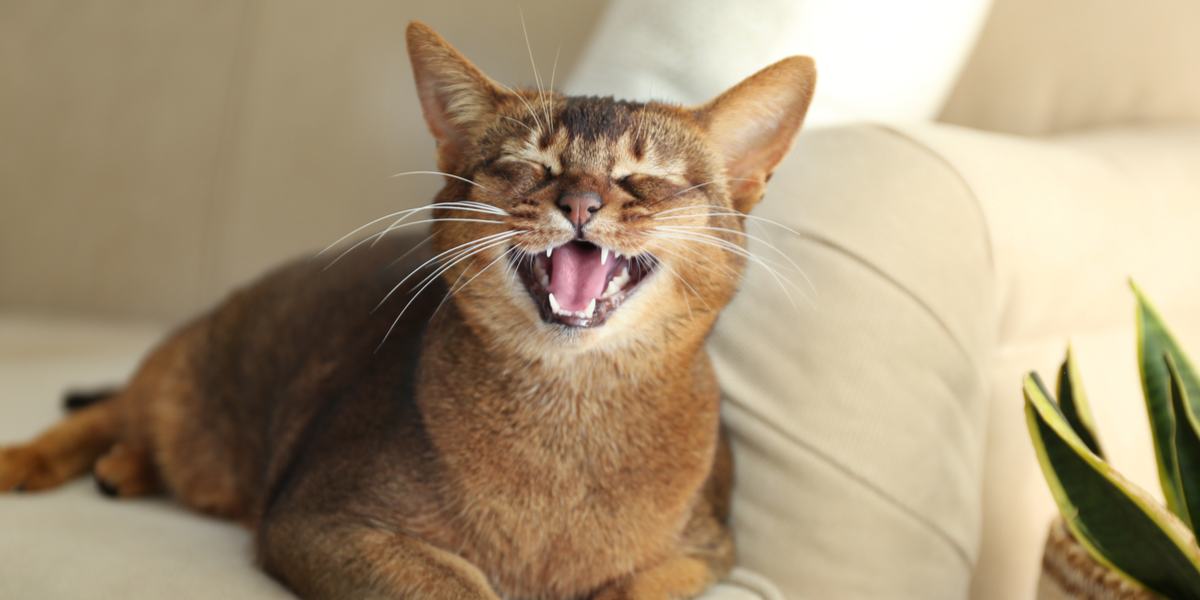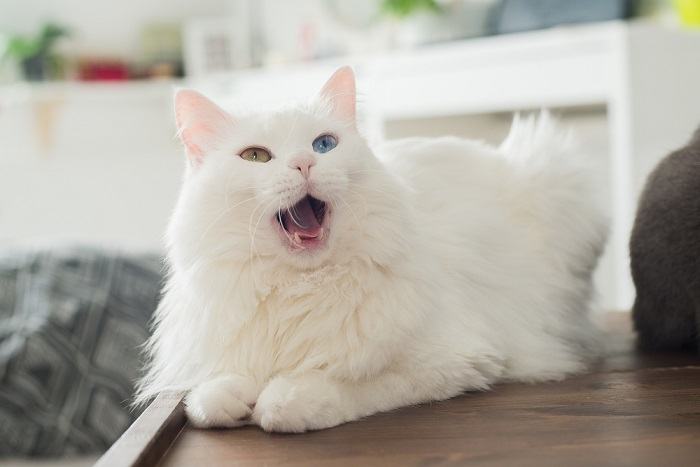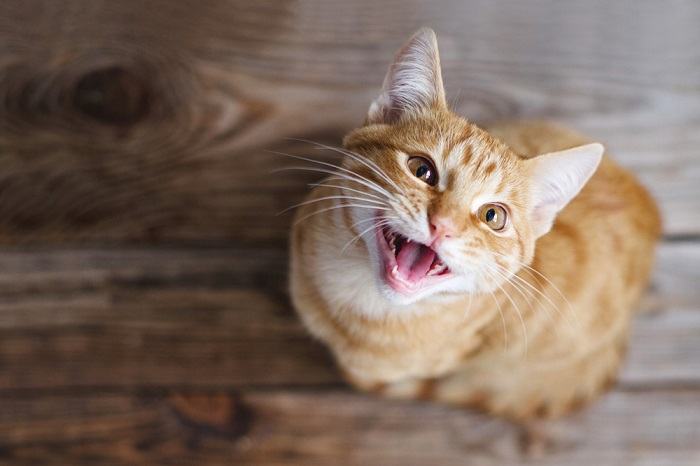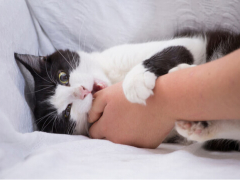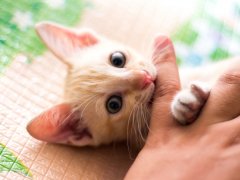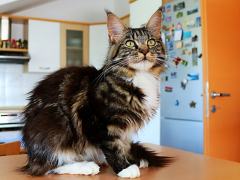If you’re reading this from the kitchen, your cat meowing loudly at your feet while looking at you expectantly, you’re not alone. Cats have unique ways of communicating with us, and sometimes it can feel like they’re being demanding, impatient, or downright clingy. So, what does it mean if your cat won’t stop meowing at you?
Why Is Your Cat Meowing At Night?
Cats can meow for lots of reasons. Some are silly cat quirks, but some are much more serious. Let’s find out some common reasons why your cat might keep meowing at you.
1. They’re hungry
Labradors aren’t the only ones controlled by their stomachs. Cats can get hangry too! If it’s dinner time and you haven’t noticed, you can expect your cat to let you know with some choice words.
On the other hand, some cats are so greedy that it doesn’t matter whether it’s technically a mealtime.
If you’re in the kitchen at night, they’ll try their luck with some persuasive meows. You might be able to combat this habit by removing the association between you and their food. You can do this using an automatic feeder if you program it to feed your cat at specific times.
2. They want your attention
Cats can be very attention-seeking, which is a compliment because it means they enjoy our company. However, if they’re particularly keen, it could mean they need more mental and physical stimulation especially during the night.
Invest in a few more toys, puzzle feeders, or activity centers to improve the enrichment of your cat’s environment, and make sure you spend plenty of quality play time with them.
3. They’re responding to you
Cats might not be able to speak the same way humans do, but that doesn’t mean they can’t communicate with us. Many cat owners spend time telling their beloved buddies about their day, what they’re cooking, or what they’re doing at work next week.
While cats can’t necessarily understand us, they pick up on our voice’s changing tones, and many cats will respond to their owner’s conversations by meowing in the right places.
4. They want to go outside
If your cat won’t stop meowing at night and they’re standing by the door or at the window, they might want to go outside. The longer you take to spring into action, the louder and more impatient they are likely to become.
Unfortunately, though, cats don’t always know what they want. If you don’t have a cat flap, you might find yourself stuck in the endless cycle of your cat meowing to go out and then meowing to come back in almost immediately.
5. They’re in season
Female cats in season often meow incessantly, which is normal but can be alarming to pet owners
If you’ve ever had a female cat in season, you’ll know there’s nothing noisier on the planet! Cats in heat take meowing to go outside to another level. That’s not all.
As well as constant meowing, they also yowl loudly as part of their normal mating behavior. You probably won’t be surprised to hear that some pet parents mistakenly think their in-season cat is unwell or in pain!
6. They want what you’ve got
You’re bound to get your cat’s attention if you’re eating something tasty, opening a can of tuna, or holding a bag of yummy cat treats. If your cat wants what you have, they’ll let you know by meowing loudly at your feet.
If they’re feeling particularly brave or persistent, they might jump onto the kitchen counter or your lap to apply more pressure!
7. They’re in pain
Cats sometimes meow to let you know that they’re in pain. Although cats are often stoic, they might vocalize to get your attention if they trust you or the pain is severe. Never assume that your cat isn’t in pain if they aren’t meowing, though.
Cats will instinctively hide the fact that they are injured or in pain, so they don’t appear vulnerable to predators.
8. They’re unwell
Like when they’re in pain, cats may not always become vocal when unwell. However, if they do suddenly start meowing loudly and constantly, it could be that they’re feeling poorly. Be sure not to ignore these changes in their behavior, and keep an eye out for any other symptoms.
9. They’re feeling anxious
Your cat might meow a lot if they’re feeling anxious or afraid. You might also notice them peeing or pooping outside the litter tray, and they might develop stress-related health problems like cystitis or overgrooming.
If your cat meows excessively when you return home from work, your cat might be suffering from separation anxiety. A pet webcam might shed some light on how they behave while you’re away. That way, you can decide whether you need the help of a veterinarian or veterinary behaviorist.
10. They have dementia
Sometimes a cat’s age causes excessive meowing. If your older cat seems to be meowing a lot and appears confused or vacant, they may be suffering from cognitive dysfunction. Senile changes can cause elderly cats to become active at unusual times of day, so if your cat is suddenly waking you up at 4am, there could be something wrong.
Other health issues like hyperthyroidism can also cause excessive vocalization, so a trip to the vet is worthwhile.
What Should You Do If Your Cat Keeps Meowing At You?
If your cat begins meowing excessively, start with a vet visit to make sure nothing is physically wrong.
If your cat has always been vocal, for instance, if they’re a Siamese, this could be absolutely normal. Similarly, if they’re vocal at specific times, like meal times or when you arrive home, that’s probably not a huge concern.
However, suppose your cat’s behavior suddenly changes, or they’re more vocal than usual. In that case, it’s best to book a checkup with a veterinarian in case there are any underlying medical conditions.
Conclusion
Cats can be very loud and a little irritating, especially if they’re following you around and being really needy. However, a clingy cat is often par for the course when you have a feline family member.
On the other hand, if their behavior changes or something doesn’t seem right with their body language, it’s always a good idea to seek the reassurance of your veterinarian.
Also Read: 5 Visual Signs of a Stressed Cat and How to Help
Frequently Asked Questions
Why is my cat so needy and vocal?
Certain cat breeds are particularly needy and vocal. For example, Siamese cats tend to have a lot to say, whereas Ragdolls are very needy. Clinginess and vocalization can indicate that your cat is hungry, bored, stressed, in pain, or unwell. With such a variety of possible causes, you should make an appointment with your veterinarian to make sure your kitty is OK.
Why is my cat suddenly obsessed with me?
If your cat is suddenly clingier or more affectionate than usual, it could mean they are stressed or frightened. They might even be in season. Keep an eye out for other symptoms and ask your veterinarian for advice.
What do I do if my cat is too clingy?
If your cat has always been clingy, it’s probably normal for them. If it’s becoming a problem for you, you can try to improve things by providing them with more toys and activities like a puzzle feeder or cat tree.
